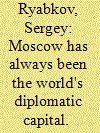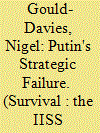| Srl | Item |
| 1 |
ID:
146292


|
|
|
|
|
| Summary/Abstract |
Armen Oganesyan, Editor-in-Chief of International Affairs: Sergey Alekseyevich, recently, two foreign service chiefs - U.S. Secretary of State John Kerry and German Foreign Minister Frank-Walter Steinmeier - visited Moscow. I would like to ask you about the outcome of the talks with them. Some experts say: "A thaw has set in. " Others, including members of our expert club, are more skeptical. Maybe the truth lies somewhere in between?
|
|
|
|
|
|
|
|
|
|
|
|
|
|
|
|
| 2 |
ID:
183782


|
|
|
|
|
| Summary/Abstract |
Russian President Vladimir Putin’s invasion of Ukraine was a grand strategic error. He underestimated Ukraine’s cohesion and will to resist, the West’s unity and resolve, the vehemence of Russia’s domestic opposition and the wariness of Russian elites. While Putin’s resort to war reflected Russia’s limited options for trying to halt Ukraine’s drift away from its remaining pull, the war itself has shattered myths about Russia’s own strength. It has exposed economic vulnerability, serious failures of military planning and battlefield execution, and deficits in information and cyber warfare. Mooted compromises involving Ukraine’s partition or neutrality do not yet feel like stable solutions whose terms all sides will accept. Parallel escalation by Russia and the West appears to be the prevailing dynamic. But even if Russia out-escalates the West, the costs of victory will be very large, not least on the home front.
|
|
|
|
|
|
|
|
|
|
|
|
|
|
|
|
| 3 |
ID:
190524


|
|
|
|
|
| Summary/Abstract |
The author considers the state of Ukraine's Armed Forces at the end of the Soviet period and today, and notes that Ukraine's military cooperation has been reoriented toward closer relations with Western countries, especially NATO members.
|
|
|
|
|
|
|
|
|
|
|
|
|
|
|
|